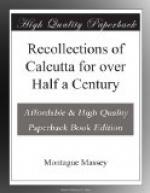[Illustration: Photo, by Present premises of Ranken & Co.]
This of course made a most wonderful and striking change in the economy of life in more ways than one, and amongst others it brought about at once and for ever the abdication of the tyrannical sway and cessation of the depredations of the aforesaid Gungadeen who had no use for kerosine as a substitute for his beloved coconut oil wherewith to anoint his body and for the other various uses to which he could apply it.
ELECTRIC LIGHTS.
Although this did not come into general vogue until the late nineties, it had been introduced in a very practical way as far back as the year 1881 in the Howrah Jute Mills Co., but after a few years it was discontinued, to be generally re-adopted in 1895 by all the jute mills. The introduction of the light into private dwellings, places of amusement, and other buildings, of course worked a marvellous change in our social life and all its conditions, but it appealed most of all to those who like myself had for so many years sat in a species of outer darkness and made it almost seem as if the past had been but a dream.
PUNKAHS AND ELECTRIC FANS.
The old, swinging punkah, with which most of us are so familiar, held on its silent way in spite of occasional attempts from time to time to oust it from its well and firmly established position. The different inventions that made their appearance always lacked the one essential point of giving expression to the kick or jerk of the hand-pulled punkah, and consequently they proved unsuccessful. I doubt much whether it would ever have been possible to create an artificial substitute for this most essential and necessary adjunct. But the advent of the electric fan also in the latter end of the nineties of course did away with the necessity for any further essays in this direction. And so at last after innumerable years of abuse but useful and indispensable work, the old punkah went the way of all things mundane.
THE HOWRAH BRIDGE
Was designed and built by Sir Bradford Leslie in 1874, and proved from the very fast an inestimable boon to the inhabitants, both of Calcutta and Howrah. It is very difficult for any one who has never had the experience of doing without it, as I have, to conceive what it was like before the bridge was built. If you wanted to cross the river except at stated intervals when the ferry-boat was plying, you had of course to go either in a dinghy or green-boat, and accidents were of frequent occurrence, particularly amongst the native element, in the rainy season, when, as we all know, the freshets are exceptionally strong. Goods and all sorts of merchandise had to be transported to and fro by cargo-boats and lighters which entailed much delay, besides extra expenses, loss, and damage to the goods by changing hands so often in transit. When the bridge was first opened a small toll was levied for each person crossing over. After a time Railway terminal charges were levied and appropriations from the revenue of the port commissioners allocated to support the upkeep of the bridge, and tolls were abolished.




